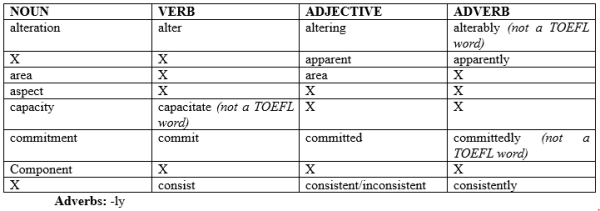Recently, Rachel announced the release of the Magoosh TOEFL Vocabulary PDF. The words in the PDF are divided into four difficulty levels: easy, common, medium, and hard. This post is the first part of a deeper study of the 49 hard words in the PDF.
For each word, I’ll show you the different forms of the word, with special attention to suffixes. Then I’ll explain each word and its different forms. This series of posts is meant to support your use of the Vocabulary PDF. Be sure to look at definitions in the PDF itself as you read this blog entry.
Difficult words 1-8: Different suffixes, different word forms
Below is a list of the first 8 hard words from the Magoosh TOEFL Vocabulary PDF. The different forms of each word are also listed. You’ll see that certain word forms are not actually TOEFL words. Studying these non-TOEFL forms is optional. Learning them is not necessary for TOEFL study, but may help your overall English skills.
Suffixes that change the form of the words:
Nouns: -ation, -ity, -ment
Verbs: -ate, -ment
Adjectives: -ing, -ed, -ent

Explanations of the words in the chart
(Read the definitions from the original PDF first)
- Alter
An alteration is a change to something. If you alter something, you make a change to it. An event that changes things could be referred to as an altering If something this designed to be changed, you could say it’s designed alterably.
- Apparent
If something is apparent, it can easily be seen, or it looks like it is true, but might not me. Imagine you are in a boat on the ocean, and you see a big grey fin sticking out of the water. It’s apparent that there’s a fin in the water. You think that apparently, a shark is swimming near your boat. Then you remember that a dolphin has a fin that looks like a shark’s fin. You realize that what apparently looks like a shark could turn out to be a dolphin.
- Area
A specific physical location can be called an area. However, on the TOEFL, this word usually refers to a specific type of academic study, or a group of related academic disciplines. For example, marine biology and nutrition are both in the life science area. You could also say that marine biology and nutrition are area disciplines in the field of life science.
- Aspect
One aspect of your application to an American university is your TOEFL score. Another aspect that an admissions office may look at is your application letter.
- Capacity
Capacity can be the ability to hold a certain amount of something, or it can refer to ability in general. My car has the capacity to comfortably hold 6 people. If you are reading this, you have the capacity to read English. By studying for the TOEFL, you are trying to capacitate yourself to pass the exam. (This means you are trying to make yourself able to pass the exam.)
- Commit
Commit has a very negative connotation when it is used to mean “do.” A person commits a bank robbery or a murder, but a person simply does a kind act or a good job. Commit can also refer to a promise rather than an actual act. In this case, the connotation is neutral. You can commit yourself to doing the right thing or the wrong thing. Either way, you are telling yourself that you definitely will do something, thus committing yourself to the action. Commit can also mean to give all of your energy and effort to something. This also can be negative or positive. You can work hard and be committed to passing the TOEFL, but you could also be committed to being unkind to someone whom you strongly dislike.
A commitment is a responsibility you must meet or something you’ve agreed to do. Having a child is a big commitment. If you have an appointment to meet a doctor at 3pm, you could say you have a 3pm commitment. A person who is giving all of their energy to doing something is a committed If you do something in a way that shows you have promised to do it or are going to make your best effort, you are acting committedly.
- Component
The Listening Section is one component of the TOEFL. Integrated Listening is one component of the TOEFL Listening Section. The keyboard is one component of your computer.
- Consist
A sandwich consists of two pieces of bread and food between the two pieces of bread. Water consists of hydrogen and oxygen. If something contains the same things throughout its form, you can say the thing is consistent. For example, a TOEFL essay that has mistakes in every sentence is consistently However, if the TOEFL essay had lots of mistakes in the first paragraph and none in the second would be inconsistent.






Leave a Reply